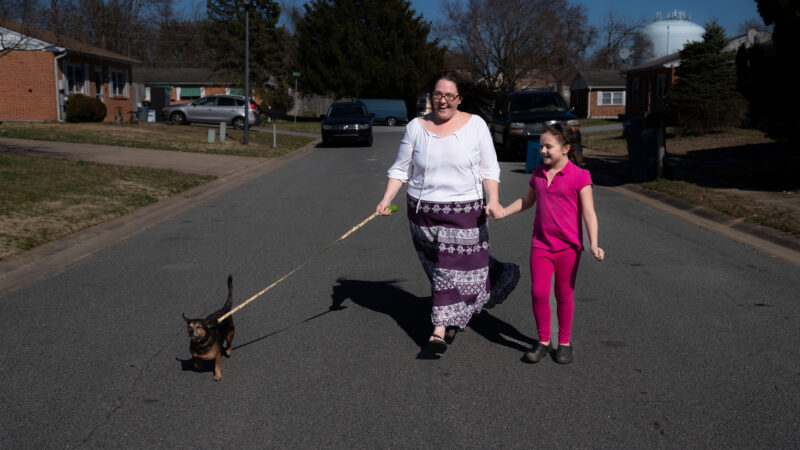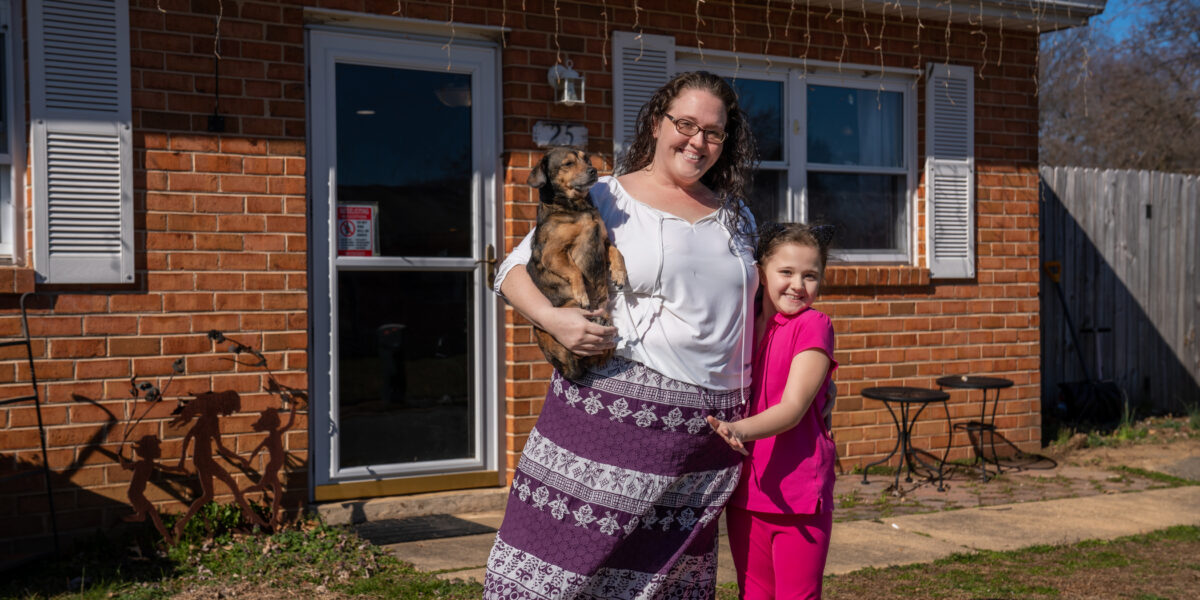Kimberly Wellman is a stay-at-home mom who usually uses social media to document funny things in her household, like her snoring senior dog, Mia, or the neighborhood skunk that scared a driver dropping off a package. But when Wellman was hospitalized with COVID-19 last fall, she liked the experience so much she made a TikTok about it.

Despite needing inpatient hospital care, Wellman slept in her own bed. She snuggled with Mia. And even though she couldn’t be in the same room with her husband and daughter to reduce their risk of exposure, Wellman could talk with them through the door, which helped ease her mind and keep her spirits high.
“As somebody who has generalized anxiety disorder and an audio processing disorder, hospitals can get very overwhelming very quickly. Even if you’re feeling all right, the constant noises, having a neighbor in your room, all of it just gets to me,” said Wellman, who is also a stroke survivor.
“This time, there was nothing overwhelming about it, which was really nice from my perspective. Actually, it was the best experience I have ever had being in a hospital. It was a real game changer for me.”
Sitting in her own chair, sleeping in her own bed
ChristianaCare is among more than 100 health systems in 37 states offering acute hospital care in a home setting, according to the Centers for Medicare and Medicaid Services. Clinical research studies comparing patients in traditional hospitals with patients who received hospital-level care at home have found lower rates of hospital-acquired infection and readmission rates. Patients also report higher levels of satisfaction with their care.
More than 500 patients have been treated through ChristianaCare’s program since it began in December 2021. The program offers the highest level of in-home acute care in Delaware through virtual and in-person care provided by a team of physicians, nurse practitioners, registered nurses and other caregivers. Round-the-clock monitoring and care, mobile lab imaging, pharmacy deliveries and nutrition services ensure the ChristianaCare Hospital Care at Home program mirrors a traditional hospital setting with the comforts of home.
Most days, there are more than a dozen patients receiving care in the program, said Steaphine Taggart, MSN, RN, CEN, CPHQ, operations director. Patients who live within 25 miles of Christiana Hospital or Wilmington Hospital and are impacted by chronic conditions such as congestive heart failure, respiratory ailments, diabetes complications and infections like pneumonia, are eligible for consideration.

Once accepted into the program, patients receive a technology kit that connects them to the command center, powered by the Center for Virtual Health. With a touch of a button, patients can access an expert team of ChristianaCare physicians and nurses day or night.
“We are committed to meeting our patients where they are, and hospital care at home is a way to help people get the care they need in a place where they are most comfortable,” Taggart said.
“Working in this program has really helped me to see the many ways we can help our patients feel better without having them deal with the additional strains of being in an unfamiliar place. This really is the care of the future available today.”
A ‘life-changing’ program
As a survivor of multiple strokes, Wellman knows how disruptive a hospital stay can be. So, when she developed symptoms consistent with COVID-19, she was nervous about seeking care.
“One of the reasons I don’t like going to the hospital is that every time I go, the first question everybody asks is, ‘Are you having a stroke?’ You get so overwhelmed because all of your history gets brought up, and when you have anxiety disorder and PTSD from that, it’s not good to have to constantly tell people the same thing over and over,” Wellman said.
Wellman had never heard of the hospital care at home program, but when the nurse in the Christiana Hospital Emergency Department mentioned she was a candidate, Wellman jumped at the chance. By the time she arrived home, the iPad and other technology she needed were already there, along with a nurse to set it up and explain how to use it.
“They had people at my house every single day. I felt very confident that I was getting the quality of care that I would have gotten in the hospital,” Wellman said.
“I could sit in my chair. I could make my own bed. I could do my laundry.”
Common health conditions treated in ChristianaCare’s Hospital Care at Home:
- COVID-19.
- Pneumonia.
- Urinary tract infection.
- COPD.
- Cellulitis.
- Congenital heart failure.
Questions? Call 302-956-1008.
It didn’t take long for Wellman to discover just how responsive in-hospital care can be. During her first night at home, Wellman fainted. When she came to, she used the emergency button to contact the hospital care at home command center. Caregivers quickly dispatched paramedics to take her to the emergency room.
Because she was currently an inpatient, Wellman didn’t have to fill out any additional paperwork. After being seen by emergency room staff, Wellman returned home – still as an inpatient.
When Pan Yeung, RN, talks with patients about what they like best about hospital care at home, they usually mention its accessibility, flexibility and instant communication. She said the program also is a relief for family members and friends who want to visit or spend time with their loved ones.
“Having them home means they don’t have to find a parking space or walk a million miles just to get to the room. Just to get to a destination for some of our families is a real challenge,” Yeung said.
On the day Wellman was discharged, a caregiver with the hospital care at home program picked up all the technology from Wellman’s home. She did not have to wait for papers before she could leave her room. Her husband could go to work without taking off time to bring her home. Her daughter knew her mom was just a few feet away.
“I’m someone who has been in hospitals a lot, and I would say this program is life-changing,” Wellman said.

Working together
As ChristianaCare’s hospital care at home program grows, it allows patients like Wellman to focus on getting better without the complications of navigating the hospital, trying to balance family visits or simply feeling out of place away from home. But it’s also deepening the patient connection for caregivers like Heather Ragozine-Bush, M.D., a hospitalist in the program.
Ragozine-Bush first heard about the program in 2021 during a meeting of the Delaware chapter of the American College of Physicians. The idea of a program to help hospital patients get better in their own familiar surroundings immediately appealed to her. As a provider who felt the burden of the staffing challenges and increased patient load during the pandemic, Ragozine-Bush was interested in finding a way to recapture her love of medicine. She reached out to Sarah Schenck, M.D., FACP, medical director of Virtualist Medicine at the Center for Virtual Health, and soon joined the team.
“I previously taught residents as an academic hospitalist and always stressed to them that trying to connect with patients on a deeper level builds trust, along with creating a medical plan that fits their goals and their plans and their finances. But with less time, more patients, sicker patients, no families allowed, and other challenges made worse by the pandemic, I was not getting to indulge in this aspect of my job. I now have that back,” Ragozine-Bush said.
“I have more time to teach patients about their disease processes and why the recommendations are what they are. I am also able to teach others involved in their care. Without sounding overly dramatic, this job has changed my entire life.”
The hospital care at home program also encourages a collaborative spirit among caregivers that supports what is best for the patient, Yeung said.
“There’s an atmosphere that we are all on the same level. We brainstorm together and try to see what we can do for the patient for the best outcome.”



